Residential Roof Types
Protect your residential property with our expertly installed roofing, featuring asphalt, slate, wood shake, tile, synthetic, metal, and flat options like EPDM, TPO/PVC, modified bitumen, built-up, and coatings, designed to safeguard your investment.
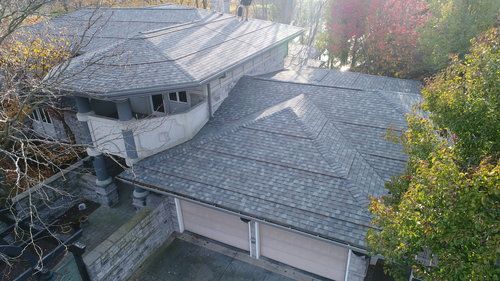
Asphalt shingles, popular in our area, offer a wide color range and versatility for any home design, accommodating different angles and slopes.
Advantages
- Cost-Effective: The most affordable roofing option, benefiting from mass production and quick installation.
- Easy Repairs: Color matching for repairs is straightforward, ensuring a cohesive look post-repair.
- Low Maintenance: Requires minimal upkeep compared to other roofing materials.
Considerations
- Common Appearance: The design and look of asphalt shingles tend to be similar across many homes.
- Damage Susceptibility: More prone to damage from wind and hail compared to more durable materials like slate or tile.
- Lifespan: Typically lasts 15-30 years, shorter than some alternative materials. The lifespan can be extended with quality installation and regular maintenance.
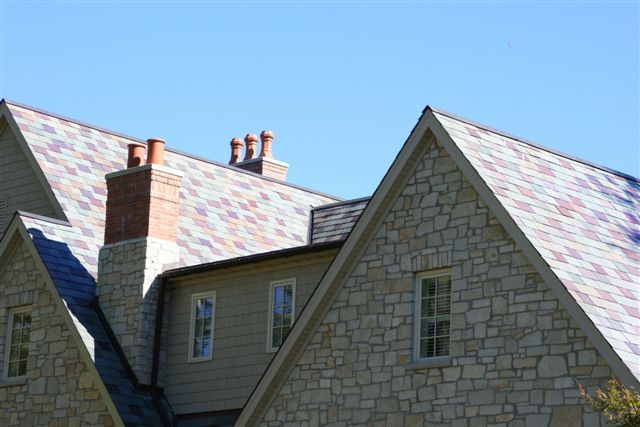
Made from naturally occurring stone, slate roofs are the oldest types of roofing material with an unmatched record of durability, beauty, and protection.
Advantages
- Unique Aesthetics: Offers a distinctive, natural stone look that enhances home beauty.
- Exceptional Longevity: Can exceed a lifespan of 100-150 years, often outlasting the buildings they cover.
- Low Maintenance: Requires minimal upkeep due to its natural durability.
- Weather Resistant: Provides robust protection against wind and hail.
Considerations
- Repair Costs: Finding an exact color match for repairs can be challenging due to the slate's natural weathering, making repairs costly.
- Installation: Material costs and labor are high, reflecting the skill needed for installation.
- Weight: Much heavier than asphalt, possibly requiring structural reinforcement of the roof deck.
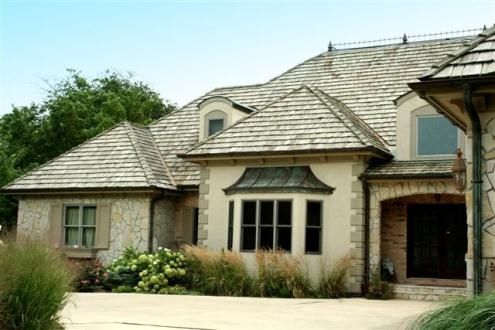
In terms of curb appeal, few roofs come close to the attractiveness and beauty of a wood shake or wood shingle roof, which are primarily manufactured using cedar.
Advantages
- Aesthetic Appeal: Enhances home exteriors with its natural wood look.
- Longevity: Often lasts twice as long as asphalt shingle roofs.
- Insulation: Provides superior insulation compared to asphalt shingles.
- Weather Resistant: Stands up well to wind and hail.
Considerations
- Cost: Both materials and installation are more expensive.
- Maintenance: Requires sealing to extend lifespan, with regular upkeep recommended.
- Climate Reactivity: Wood can shrink and expand with temperature fluctuations, affecting fit and finish.
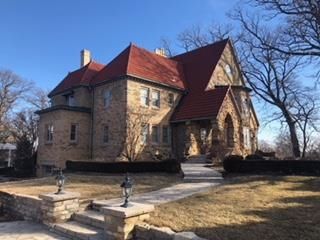
Clay tile is a unique way to add color and design to your home.
Advantages
- Longevity: Can last over 100 years, providing exceptional value over time.
- Variety: Available in numerous designs, profiles, textures, and finishes due to its moldable and bakeable nature.
- Environmental Resistance: Offers robust protection against hail, fire, and wind.
- Low Maintenance: Requires minimal upkeep compared to other roofing materials.
- Energy Efficiency: Features built-in ventilation that helps reduce energy costs.
Considerations
- Cost: Both materials and installation are on the higher end of the price spectrum.
- Weight: Significantly heavier than asphalt, potentially requiring structural reinforcement.
- Climate Suitability: Not all clay tile is optimal for freezing temperatures, necessitating careful selection based on climate.
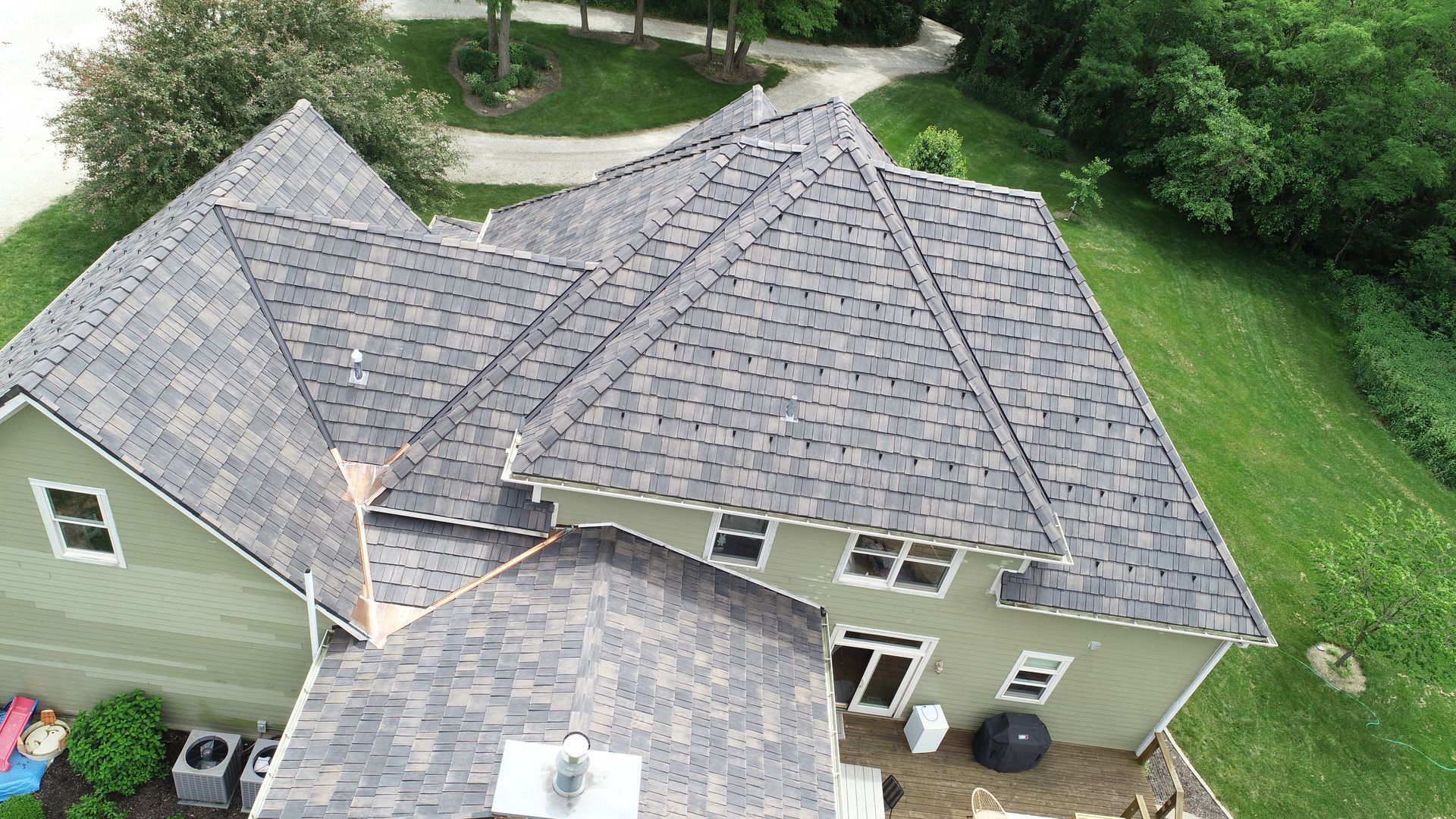
Synthetic roofing, made from recycled plastics and rubber, mimics traditional materials like slate, clay tile, and wood shake.
Advantages
- Lightweight: Easily installed over existing roofs with minimal adjustments needed.
- Claimed Durability: Though newer on the market, manufacturers offer long warranties, suggesting confidence in longevity.
- Extended Warranties: Some products come with warranties up to 50 years, indicating a strong return on investment.
Considerations
- Market Newcomer: With its introduction in the mid-'90s, real-world longevity data is still accumulating.
- Installation Expertise: Not all roofers are experienced with synthetic materials, potentially limiting contractor options.
- Higher Installation Costs: The specialized nature of synthetic roofing can lead to higher costs compared to more common materials.
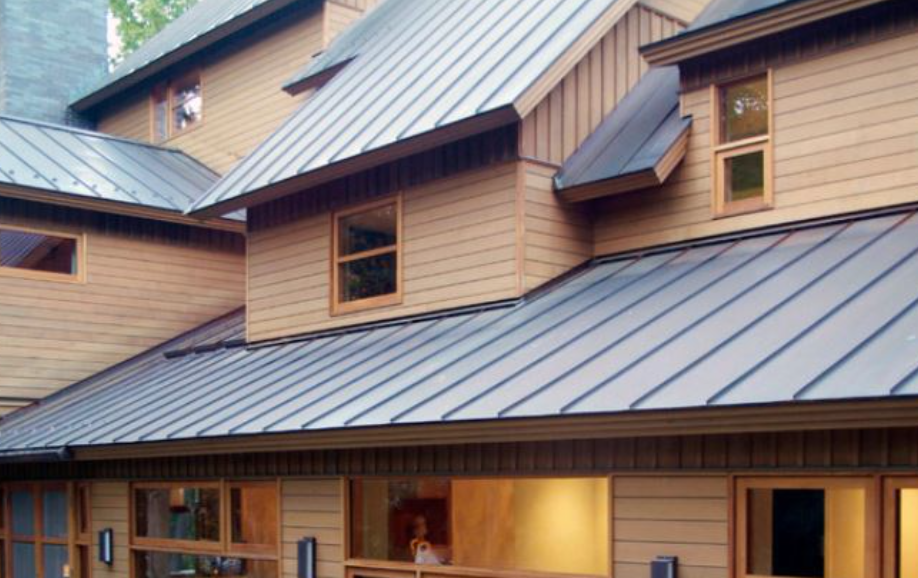
There are three different types of metal roofing systems: architectural metal panel, structural metal panel and metal shingles. Metal roof systems offer a unique look with numerous benefits.
Advantages
- Longevity: Metal roofs can last 40-70 years, depending on the material.
- Energy Efficiency: Reflective properties reduce cooling costs.
- Environmentally Friendly: Made from recycled materials and fully recyclable.
Considerations
- Color Matching: Difficulties may arise with expansions or repairs due to fading.
- Noise: Can be louder during rain or hail compared to other materials.
- Cost: Generally more expensive upfront than other roofing options.
- Installation: Requires skilled professionals for meticulous installation.
EPDM roofing, a durable synthetic rubber, excels in weather resistance for flat or low-slope roofs.
Advantages
- Durability: EPDM roofs are known for their long lifespan, often lasting up to 30 years with proper maintenance.
- Weather Resistance: Highly resistant to extreme weather conditions, including temperatures, UV rays, and more.
- Cost-Effective: Generally more affordable than other commercial roofing options, both in initial installation and maintenance.
- Eco-Friendly: EPDM is often made with recycled materials and is fully recyclable at the end of its life cycle.
Considerations
- Aesthetic Limitations: Primarily available in black, which may not suit all architectural styles or preferences for heat reflection.
- Puncture Risk: While durable, EPDM can be susceptible to punctures from foot traffic or debris.
- Installation Sensitivity: Requires a clean, precise installation process to prevent leaks, emphasizing the need for an experienced installer.
- Maintenance: Regular inspections and maintenance are necessary to ensure the longevity of an EPDM roof, particularly after heavy weather events.
TPO (Thermoplastic Polyolefin) and PVC (Polyvinyl Chloride) roofing systems offer modern solutions for flat or low-slope roofs, combining durability with energy efficiency.
Advantages
- Energy Efficiency: Highly reflective surfaces reduce cooling costs.
- Durability: Resistant to chemicals, UV light, and punctures.
- Versatility:
Suitable for various commercial and residential applications.
Considerations
- Installation Expertise: Requires skilled installation for optimal performance.
- Cost:
Initial installation costs can be higher compared to traditional materials.
Modified bitumen is an evolution of the classic built-up roof, designed for buildings requiring robust, waterproof, and flexible roofing solutions.
Advantages
- Flexibility: Adapts to temperature changes without cracking.
- Durability: Offers enhanced tensile strength compared to traditional asphalt roofs.
- Easy Maintenance: Simple to repair and maintain over its lifespan.
Considerations
- Heat Absorption: Can absorb more heat unless treated with reflective materials.
- Installation: Cold-applied options streamline installation, but proper application techniques are crucial for long-term performance.
Built-up roofs (BUR) are time-tested flat roofing systems, known for their multi-layered protection and reliability.
Advantages
- Proven Track Record: Offers decades of proven performance and durability.
- Waterproofing: Multiple layers provide superior resistance to water.
- Cost-Effective: Long lifespan reduces the need for frequent replacements.
Considerations
- Heat Absorption: Can absorb more heat unless treated with reflective materials.
- Installation: Cold-applied options streamline installation, but proper application techniques are crucial for long-term performance.
Roof coatings are applied over existing roofing systems to extend their life, improve reflectivity, and enhance waterproofing capabilities.
Advantages
- Extended Lifespan: Significantly prolongs the life of your roof, delaying the need for full replacement.
- Versatility: Compatible with a wide range of roofing materials, including metal, bitumen, and single-ply membranes, making them a flexible solution for various roofing systems.
Considerations
- Preparation: Requires thorough cleaning and preparation of the existing roof surface.
- Reapplication: Over time, coatings may need to be reapplied to maintain effectiveness.
